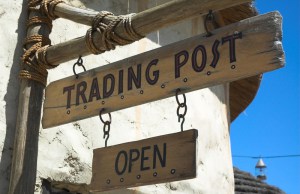
You can’t live without food and water. If you store them, you can’t use them if someone puts a bullet in you and you bleed out, so you have to learn to use weapons and practice first aid. And you need a shelter to keep supplies in, away from rain, sun, and vermin of all shapes and leg-counts. These things are what the “Prepper” community often focuses on. And they’re right to do so. Food, water, guns, ammunition, medical supplies, and shelter are all essential. But there’s one thing that, while not completely ignored, is I believe sorely neglected among the Survivalist segment of the population. And that is morale. Maintaining your group’s morale in crisis will be vital to ensuring your survival.
History is replete with examples of armies that had the best equipment but nonetheless lost their wars. The Vietnam War is one of the best case studies. The United States Armed Forces totally outclassed their Vietnamese enemies. American weapons, aircraft, supply lines, and medical facilities were superior. But American morale was, by war’s end, non-existent. To this day veterans and their families are rightfully bitter about the mismanagement, corruption, and the political obfuscation that turned the most powerful military on earth into a hogtied police force.
Now when—not if—the organic material strikes the ventilator, we as preppers will likely not be engaged in a large-scale war with multiple campaigns and the associated logistical requirements, chains of command, and so on. I’m not saying it’s impossible, but it is very unlikely. We will, however, probably find ourselves in some kind of defensive armed conflict against elements of chaos and disorder from time to time. Whether they be an actual invading army, an organized and disciplined (to varying degrees) gang who have decided that what’s yours is theirs, or just a mob of desperate citizens who, having failed to prepare, have decided to liberate “their fair share” from you.
But even if none of us ever draw a blade or fire a gun in anger, after something collapses (and it will, sooner or later), life will become much harder. The old pressures of getting reports submitted on time or making it to that meeting will pale in comparison with the possibility that, if your garden fails, you and your family may starve. That is just one out of the scores of possibilities plaguing the future of a post-collapse society.
Amid this grim backdrop we find the subject of morale. Morale, for those few unfamiliar with the term, is the state of the spirits and confidence of a group and its willingness to perform its tasks. So if your morale is high, your people in your group will be more likely to perform their tasks cheerfully and to bolster one another’s spirits. If it is low, they will perform their duties grudgingly if at all, and will either actively or passively drag each other down.
Why is maintaining morale in crisis important to your group?
This is poison for any post-collapse situation. You need your people with their heads in the game, pulling together and doing everything they can to ensure their own and other’s survival. This is what, from my experience, is neglected in the preparedness community: means of maintaining morale. Ways to keep all the days from blending together into a depressing fog. Some people toss in the token “non-electric entertainments like cards or board games” and leave it at that, but I believe there is more to it.
Now before I go any further, let me address what I believe will be the greatest objection to this idea of making morale a priority. People will likely say “But, it’s going to be a constant grind! There’s no time for fun and games! Everything you do, every waking minute, must produce or preserve a survival essential!” To which I respectfully reply: Make time.
Again, I draw on history. Throughout the past 6,000 years of human existence on this planet, up until the last eighty or hundred years, the large majority of humanity has had to struggle for its survival. Food was unpredictable, politics and war were largely out of their control, and clean water was doubtful. Yet they still created beautiful things, sang songs, played instruments, danced together, and gathered to listen to the village storyteller or wandering troubadour weave tales of fantasy, history, and heroism. Why? Because they understood the importance of morale. They needed these things—in their proper place as supplements to work—to fortify their spirits for the hard labor and suffering in the days ahead.
So, with that background, I have two broad categories of morale-boosters that I think will become far more important post-collapse than they are now. These are: Music and Storytelling.
Music:
Music is everywhere around us today. It’s actually really hard to get away from it. Most of us have some kind of radio playing at work, whether we want it or not. There is music piped in to the gas station, the grocery store, the insurance agent, wherever you go it’s there. And most people walk around with earbuds crammed into their ears, listening to music off iPod and MP3 players.
I’m not against having music readily available. As someone who has no skill in playing it but still enjoys a good tune, I like having easy access to music. But something to bear in mind is that all these forms of easily accessible music rely on electricity to function properly. And post-collapse, electricity will likely (not certainly, but likely) be in very short supply. If you can get it at all. So musical-playback devices won’t be a high priority in that situation. This is where my recommendation comes in: Learn to actually play music.
I’m not saying everyone should do this. Not everyone has the time, the money for instruments and lessons, and more importantly not everyone has the desire and innate skill needed to play an instrument. I am an example of this. I can keep a pretty good rhythm on a Celtic drum, and go along that way with someone else, but outside of that, I can’t play. I’ve tried at various points in my life to play guitar and recorder, and never made the time to stick to either of them. My sister, on the other hand, is a natural with anything stringed. She can play fiddle and guitar, and is learning banjo, mandolin, and ukulele. So she is an asset to us that way. We may not be able to play, but she can, and that will help to lift our spirits.
Another suggestion would be to try to learn to sing. I don’t mean take voice lessons or opera classes per se. I mean try to do something besides wail out the words to your favorite song like a dying cat. It helps if you have sheet music to learn the words from. Even if you can’t read music, you can follow the notes up and down to see where your voice should go, and you can use the spaces between notes to gauge how long to hold a note as you sing. It won’t be perfect, but hopefully it will prevent people running away with their hands over their ears.
There is one more thing I have to say on the subject of music: learn to like music that can be made without electricity. Most music today relies on electricity. Pop, rock, hip-hop, rap, country, blues, jazz, everything. Once there is no more juice to power electric instruments, amplifiers, and microphones, people will be left with nothing but the instruments available about a hundred years ago. This means we’ll be back to things like classical, bluegrass, folk (which includes ethnic music from Africa, Asia, Europe, and Latin America), some forms of jazz, and similar genres. I’m not saying you have to like all of these. Personally, I like Celtic, classical, and bluegrass music, but am not a big fan of Asian folk music. Whatever your preferences, try to learn one of the instruments associated with your choice or to surround yourself with people who play what you like. This may sound like I’m making a big deal out of nothing, but I’m serious. I’m not that old and I’ve already known plenty of people who would be lost during their workday if they didn’t have their heavy metal, rock, modern country, or pop music blasting away from a speaker plugged into the grid. Music, especially aggressive, highly electronic forms, can be addictive. And once it’s gone these people are going to be looking for it or a replacement the same way they would look for a physical drug. So break yourself of the addiction before it’s too late. I’m not saying never listen to a rock or country song again. I happen to like several songs from those genres and listen to them often. But I won’t go into musical withdrawals if tomorrow I could never hear them again.
Storytelling:
So, those were my thoughts on music. What about storytelling? You’re probably thinking, “Why did he even include this? Stories aren’t essential to survival.” That’s true, they’re not. But they are important to morale. Think about it: how satisfying is it to come home from your job or whatever you do all day and sit down to a good book or your favorite television show? Pretty enjoyable, right? There you go. That’s why I bring it up. Reading or watching a good story helps pull you out of whatever rut you managed to dig for yourself that day, and transports you to another world where, if things go wrong, they get put right. Or at least, they go wrong for someone else.
One of the most popular people in villages and cities of any size was the minstrel, bard, or troubadour.
Once more, I will reference history. While there is dispute about just how dark the so-called “Dark Ages” really were, and the popular image of the medieval era as a miserable time to be alive is exaggerated, there is no doubt that it was orders of magnitude harder than our own. During this time, one of the most popular people in villages and cities of any size was the minstrel, bard, or troubadour. These men—and they were nearly always men, but that isn’t a stereotype that needs to carry over—were sometimes locals, sometimes wanderers. They brought news from afar, and told stories of the past exploits of people both from the countryside and from distant lands. Crowds would gather to hear them speak, and even if they were looked down upon officially, they were highly admired in general society.
Why? Because they helped lighten people’s loads after or during a hard day in a hard life. One reason fantastical adventures of knights and heroes were so popular was because, in a world often out of the control of the average peasant, hearing a story about a man who kills a monster, saves a town, and gets to marry the beautiful woman reminds them that there is hope in the world, that justice still exists, and that true love is still possible. These things helped them relate to their world and allowed them to bear the trials they encountered more easily.
So how does this apply to preppers? Two ways. First, if you have a natural storyteller in your group, don’t belittle them for their gift. Good stories don’t just appear out of the air: it takes a lot of mental energy and creativity to make up a compelling story. The most obvious way a storyteller like this can be a benefit is to calm restless, frightened children. If you’ve had to bug out or evacuate, and couldn’t take your home library with you, then having someone in your group who has the skill to make up stories will go a long way towards keeping children calm.
Second, depending on how long any post-collapse situation lasts, having an oral/written method of transmitting will help people connect with the past, with the pre-collapse world. Even though these methods are notorious for allowing inaccuracies to creep in quickly, they still allow a level of continuity with those who came before.
For anyone reading this who fancies themselves a storyteller, I have one word for you: paper. In a post-collapse world, with electricity scarce or non-existent, paper will be your best friend. But in our digital age, we don’t want to deal with something as time-consuming and laborious to compose as a longhand manuscript. I have been an editor and columnist for an online magazine, and I know firsthand how much easier it is to write on a computer than on paper. But I can do it, if necessary. If you’re wanting to write a longer work, don’t try to do it all at once. Write chapters or scenes one at a time, and share them that way. In this manner, you’ll save your hands, and your audience will be kept in suspense about what happens next. This will give them something enjoyable to think about as they go about their days. And if you don’t end up writing anything down for your group or if you’re not the best storyteller in the group, don’t worry. All those dollar-store tablets or bundles of lined filler paper you stocked up on have a baker’s dozen other uses!
Also, before I close, I just want to return to my earlier brief mention of art. Art has been, for most of human history, a fairly exclusive domain, inhabited by a very few people. But that doesn’t mean their products were reserved for only the very wealthy. The Hollywood image of the bare peasant hovel with nothing in it to liven the gaze is not correct. Especially in highly developed societies like those of the Celts and the Dark-Age Norse, art imbued even everyday, mundane objects with a sense of power and purpose beyond their original intent, which must surely have helped their owners weather their tough existence. So while I have mainly focused on music and storytelling here, much of what I have said can apply to carving, sculpting, painting, or other arts.
Conclusion:
None of what I have said should be taken to mean that morale-boosters should take primacy over things like canned food, weapons and ammunition, water, and medical supplies. Nor do I condone people who are artists and musicians and storytellers ignoring other elements of preparedness. Everyone should prepare the essentials to whatever degree their circumstances allow. These supplementals are nonetheless an important aspect to consider as you make your preparations. And if you can think of something else I haven’t listed that would fit your group, please, do that instead! This article was by no means meant to be exhaustive or to be a checklist. Just to get your wheels turning.. Godspeed to you and yours.
Other self-sufficiency and preparedness solutions recommended for you:
Healthy Soil + Healthy Plants = Healthy You
The vital self-sufficiency lessons our great grand-fathers left us
Knowledge to survive any medical crisis situation
Liberal’s hidden agenda: more than just your guns
Build yourself the only unlimited water source you’ll ever need
4 Important Forgotten Skills used by our Ancestors that can help you in any crisis






















